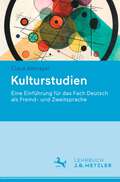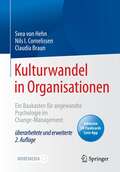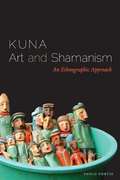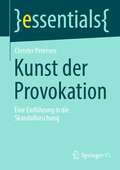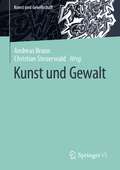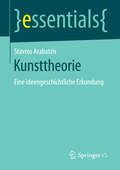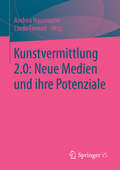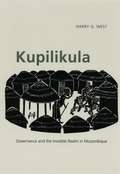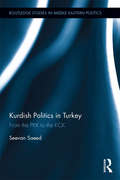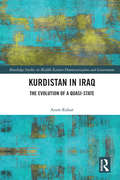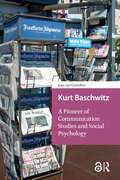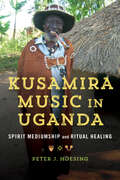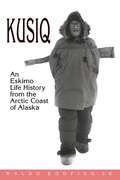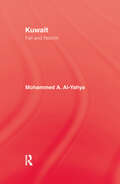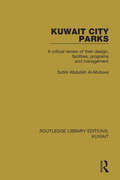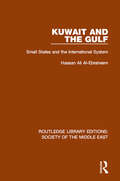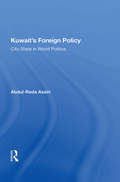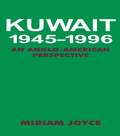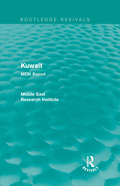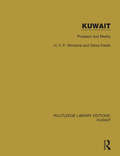- Table View
- List View
Kulturstudien: Eine Einführung für das Fach Deutsch als Fremd- und Zweitsprache
by Claus AltmayerDiese Einführung macht mit den wichtigsten Problemstellungen, Konzepten und Lösungsansätzen des Wissenschaftsbereichs Kulturstudien im Fach Deutsch als Fremd- und Zweitsprache vertraut. Wozu ist die Beschäftigung mit Kultur beim Lernen von Deutsch nötig? Was genau ist mit ‚Kultur‘ gemeint? Und wie kann man sie beschreiben? Daneben kommen aktuelle Ansätze des ‚kulturbezogenen Lernens‘ sowie Forschungsperspektiven zur Sprache. Das Buch richtet sich an Studierende, Lehrende und Forschende des Fachs DaF/DaZ sowie an alle, die an Fragen von Kultur und Kulturvermittlung interessiert sind.
Kulturwandel in Organisationen: Ein Baukasten für angewandte Psychologie im Change-Management
by Nils I. Cornelissen Claudia Braun Svea von HehnKulturveränderung in vier Schritten! Dieses Fachbuch bietet Ihnen konkrete Werkzeuge für die vier iterativen Phasen eines Kulturwandels, u.a. wie durch viralen Change großflächige Veränderung in kurzer Zeit passiert und veranschaulicht die Techniken mit praxisnahen Fallbeispielen aus der Unternehmenswelt. Es bringt die hierfür wichtigsten Erkenntnisse aus der angewandten Psychologie auf den Punkt. Die Autoren verknüpfen auf verständliche Weise praktische Handlungsanleitungen aus ihrer jahrzehntelangen Beratungserfahrung mit den Erkenntnissen der Verhaltensökonomie und der Neurowissenschaften. Dazu sind Fragen und Antworten zum Selbsttest über die Flashcard App inkludiert. Der Inhalt • Konkrete Werkzeuge für die vier iterativen Phasen eines Kulturwandels, u.a. wie Vorbilder geschaffen werden und Change Stories überzeugender sein können• Praxisnahe Fallbeispiele aus der Unternehmenswelt, u.a. zu Wandel durch Digitalisierung • Fundiertes Hintergrundwissen zu Verhaltens- und Einstellungsänderung, u.a. zu Willenskraft (Willpower) und Gewohnheitsänderungen, Mindsets und Sinnhaftigkeit (Purpose) als Veränderungstreiber• Fünf grundlegende Designprinzipien, u.a. was IKEA-Regalaufbauen mit Wandel zu tun hat• Tipps für Akteure des Kulturwandels, wie sie mittels emotionaler Intelligenz und Achtsamkeit Resilienz stärken und Veränderung auch gegen Widerstände meistern• Hilfreiche Didaktik durch Zusammenfassungen, Checklisten der Erfolgsfaktoren, Hintergrund-, Reflexions- und Übungsboxen Die Zielgruppen Führungskräfte, Organisationsentwickler, Personaler und Berater in Startups, im Mittelstand und in größeren Unternehmen sowie öffentlichen Organisationen Die Autoren Dr. Svea von Hehn arbeitet seit 1999 international als Managementberaterin (u.a. für McKinsey). Sie ist diplomierte, promovierte Psychologin, mehrfach zertifizierter systemischer Coach (u.a. für Search Inside Yourself, Google’s Achtsamkeitsprogramm) und Partnerin bei RETURN ON MEANING. Nils I. Cornelissen arbeitet seit 2003 international als Managementberater (u.a. für McKinsey). Er ist Diplom-Kommunikationswirt und hat einen Master in Psychologie und Soziologie. Er ist zertifizierter Coach sowie Facilitator und Partner bei RETURN ON MEANING. Claudia Braun arbeitet seit 2007 international als Managementberaterin (u.a. für McKinsey). Sie ist Diplom-Betriebswirtin in internationaler BWL, hat einen Master of Public Administration, einen Master of Public Policy sowie diverse Zertifizierungen z.B. als systemischer Coach und MBSR-Trainerin. Sie ist Partnerin bei RETURN ON MEANING.
Kuna Art and Shamanism: An Ethnographic Approach
by Paolo FortisKnown for their beautiful textile art, the Kuna of Panama have been scrutinized by anthropologists for decades. Perhaps surprisingly, this scrutiny has overlooked the magnificent Kuna craft of nuchukana-wooden anthropomorphic carvings-which play vital roles in curing and other Kuna rituals. Drawing on long-term fieldwork, Paolo Fortis at last brings to light this crucial cultural facet, illuminating not only Kuna aesthetics and art production but also their relation to wider social and cosmological concerns. Exploring an art form that informs birth and death, personhood, the dream world, the natural world, religion, gender roles, and ecology, Kuna Art and Shamanism provides a rich understanding of this society's visual system, and the ways in which these groundbreaking ethnographic findings can enhance Amerindian scholarship overall. Fortis also explores the fact that to ask what it means for the Kuna people to carve the figure of a person is to pose a riddle about the culture's complete concept of knowing. Also incorporating notions of landscape (islands, gardens, and ancient trees) as well as cycles of life, including the influence of illness, Fortis places the statues at the center of a network of social relationships that entangle people with nonhuman entities. As an activity carried out by skilled elderly men, who possess embodied knowledge of lifelong transformations, the carving process is one that mediates mortal worlds with those of immortal primordial spirits. Kuna Art and Shamanism immerses readers in this sense of unity and opposition between soul and body, internal forms and external appearances, and image and design.
Kunst der Provokation: Eine Einführung in die Skandalforschung (essentials)
by Christer PetersenWie können die Charakteristika, die Themen, Inhalte und Verläufe von modernen Skandalen in den Massenmedien beschrieben werden, wie die kommunikativen Verfahren und Ökonomien der Generierung öffentlicher Empörung, denen Skandale der Politik, der Kunst und Kultur heute folgen? Dieses Essential bietet eine prägnante Einführung in den Status quo der Skandaltheorie und zeichnet am Fallbeispiel Skandalisierungsverfahren als eine Kunst der Provokation öffentlicher Aufmerksamkeit nach.
Kunst und Gewalt (Kunst und Gesellschaft)
by Andreas Braun Christian SteuerwaldDas Buch untersucht den bisher nur unzureichend untersuchten Zusammenhang von Kunst und Gewalt. Mit theoretischen, empirischen und methodischen Beiträgen von Gewalt- und Kunstsoziolog:Innen richtet sich das Buch nicht nur an ein soziologisches Fachpublikum, sondern zugleich auch an eine breite sowohl an Kunst als auch Gewalt interessierte Öffentlichkeit.
Kunsttheorie: Eine ideengeschichtliche Erkundung (essentials)
by Stavros ArabatzisDieses essential bietet eine ideengeschichtliche Erkundung des modernen Begriffs von Kunst. Es leistet eine theoretische Unterscheidung zwischen dem alten und neuen Kunstbegriff (,,Kultwert" und ,,Ausstellungswert") und zeigt zugleich ihre beider Ununterscheidbarkeit im neuen Kultgegenstand der interaktiv-vernetzten Kultur. Es schl#65533;gt Positions- und Kursbestimmungen f#65533;r eine zuk#65533;nftige Kunst vor, die den imperativen M#65533;chten nicht mehr gehorcht.
Kunstvermittlung 2.0: Neue Medien und ihre Potenziale
by Andrea Hausmann Linda FrenzelDie Neuen Medien eröffnen vielfältige Chancen für die Vermittlungsarbeit in Museen, Ausstellungshäusern und anderen Kultureinrichtungen. Vor allem ermöglichen sie eine verbesserte, direkte Einbeziehung der Besucher in die Inhalte. Die Auseinandersetzung mit Kunst wird so zu einem spannenden, partizipativen und interaktiven Erlebnis. Es ist Ziel dieses Buchs, die Potenziale der Neuen Medien für die Vermittlungsarbeit in Kunst und Kultur fundiert zu untersuchen und im Hinblick auf die Gewinnung, Entwicklung und Bindung von Besuchern praxisnah zu beleuchten.
Kunstvermittlung 2.0: Neue Medien und ihre Potenziale
by Andrea Hausmann and Linda FrenzelDie Neuen Medien eröffnen vielfältige Chancen für die Vermittlungsarbeit in Museen, Ausstellungshäusern und anderen Kultureinrichtungen. Vor allem ermöglichen sie eine verbesserte, direkte Einbeziehung der Besucher in die Inhalte. Die Auseinandersetzung mit Kunst wird so zu einem spannenden, partizipativen und interaktiven Erlebnis. Es ist Ziel dieses Buchs, die Potenziale der Neuen Medien für die Vermittlungsarbeit in Kunst und Kultur fundiert zu untersuchen und im Hinblick auf die Gewinnung, Entwicklung und Bindung von Besuchern praxisnah zu beleuchten.
Kupilikula: Governance and the Invisible Realm in Mozambique
by Harry G. WestOn the Mueda plateau in northern Mozambique, sorcerers are said to feed on their victims, sometimes "making" lions or transforming into lions to literally devour their flesh. When the ruling FRELIMO party subscribed to socialism, it condemned sorcery beliefs and counter-sorcery practices as false consciousness, but since undertaking neoliberal reform, the party—still in power after three electoral cycles—has "tolerated tradition," leaving villagers to interpret and engage with events in the idiom of sorcery. Now, when the lions prowl plateau villages ,suspected sorcerers are often lynched. In this historical ethnography of sorcery, Harry G. West draws on a decade of fieldwork and combines the perspectives of anthropology and political science to reveal how Muedans expect responsible authorities to monitor the invisible realm of sorcery and to overturn or, as Muedans call it, "kupilikula" sorcerers' destructive attacks by practicing a constructive form of counter-sorcery themselves. Kupilikula argues that, where neoliberal policies have fostered social division rather than security and prosperity, Muedans have, in fact, used sorcery discourse to assess and sometimes overturn reforms, advancing alternative visions of a world transformed.
Kurdish Politics in Turkey: From the PKK to the KCK (Routledge Studies in Middle Eastern Politics)
by Seevan SaeedIn the aftermath of the collapse of the Ottoman Empire, the Kurds were promised their own state. However, several factors meant that this dream never became a reality, and the land of the Kurds was divided. Amid a sense of a loss of identity, the Kurds started to fight for their social and political rights. ‘Kurdish Politics in Turkey’ argues that the Kurdish struggle has largely been a failure, and that the emergence of the Unions of Communities in Kurdistan (KCK) has been a direct result of this. The book examines the success of the KCK and how it has transformed this Kurdish struggle in Turkey from a one-dimensional political movement, to a multi-dimensional social movement.
Kurdistan in Iraq: The Evolution of a Quasi-State (Routledge Studies in Middle Eastern Democratization and Government)
by Aram RafaatThe Kurdish-Iraqi conflict lies in the fact that Kurdistan is a nation-without-a-state and Iraq is a non-nation state, each possessing a nationhood project differing from and opposing the other. Iraqi-Kurdistan is an outward looking entity seeking external patronage. Though external patronage has played a pivotal role in the evolution of the Kurdish quasi-state, a lack of positive patronage has prevented it from achieving independence. This book looks at how the Kurdish and Iraqi quests for nationhood have led to the transformation of Iraqi Kurdistan into an unrecognised quasi-state, and the devolution of the Iraqi state into a recognised quasi-state. This is done by examining the protracted Iraqi-Kurdish conflict and by analysing the contradictions and incompatibilities between the two different nationalisms: Iraqi and Kurdish. The author explains that Kurds as a nation without a state have their own nationhood project which is in opposition to the Iraqi nationhood project. Each has its own identity, loyalty and sovereignty. The book answers the question as to how the Kurdish quest for nationhood has been treated by successive Iraqi regimes. Furthermore, it fills in the literary gaps which exist in relation to the Iraqi-Kurdish conflict by specifying and categorising the cardinal conditions that drive ethnic and nationalist conflicts which lead to the creation of separatist entities. Drawing upon a vast amount of untapped Kurdish and Arabic primary sources, the book draws on prominent theories on nation-states and quasi-states. It will particularly appeal to students and scholars of international relations, political theory and Middle Eastern Studies.
Kurt Baschwitz: A Pioneer of Communication Studies and Social Psychology
by Jaap GinnekenIn this accessible, unique study of a forgotten but noteworthy figure, the author tells the story of the life of Kurt Baschwitz (1886—1968), a scholar who fled from the Nazis. He wrote six books, never translated into English, on four related themes: the press, propaganda, politics, and persecution. Baschwitz independently developed concepts that are now seen as key to communication science and social psychology, and the author places Baschwitz’s ideas in the wider context of his dramatic life and times.
Kusamira Music in Uganda: Spirit Mediumship and Ritual Healing
by Peter J. HoesingA performance culture of illness and wellness In southern Uganda, ritual healing traditions called kusamira and nswezi rely on music to treat sickness and maintain well-being. Peter J. Hoesing blends ethnomusicological fieldwork with analysis to examine how kusamira and nswezi performance socializes dynamic processes of illness, wellness, and health. People participate in these traditions for reasons that range from preserving ideas to generating strategies that allow them to navigate changing circumstances. Indeed, the performance of kusamira and nswezi reproduces ideas that remain relevant for succeeding generations. Hoesing shows the potential of this social reproduction of well-being to shape development in a region where over 80 percent of the population relies on traditional healers for primary health care. Comprehensive and vivid with eyewitness detail, Kusamira Music in Uganda offers insight into important healing traditions and the overlaps between expressive culture and healing practices, the human and other-than-human, and Uganda's past and future.
Kusiq: An Eskimo Life History From The Arctic Coast Of Alaska
by Waldo BodfishIf you are a casual reader who wants an intriguing glimpse into Eskimo life, a novice oral historian who wants to know how it is done right, or a student of Alaska who wants an Inupiat perspective of the changes that swept the western Arctic this century, read Kusiq. <P><P>(Journal of the West) <P><P> A vivid 'inside' account of an observant Eskimo male who mastered much of the traditional subsistence technology and lore and who lived through the end of commercial whaling, the development and decline of introduced reindeer herding and the fur market, and through World War II and its aftermath. In its scope as well as in the presentation of historical, cultural, and linguistic context, Kusiq is far more extensive than [other] autobiographies. <P><P>(American Indian Culture and Research Journal) <P><P> Kusiq represents a new wave in literature, the expressions of cultural awakenings among native American cultures, the attempt to redefine the native world in written form, to recast history, a history for too long the domain of the white system. <P><P>(ARCTIC) <P><P> It would be difficult to find a better, more interesting first-person account of Eskimo life during the first half of this century. [It is] second in an ambitious series of oral histories developed by the University of Alaska Press. <P><P>(Scan-A-Book)
Kuwait - Fall & Rebirth: Fall And Rebirth
by Al-YahyaFirst published in 1993. Routledge is an imprint of Taylor & Francis, an informa company.
Kuwait City Parks: A Critical Review of their Design, Facilities, Programs and Management (Routledge Library Editions: Kuwait #3)
by Subhi Abdullah Al-MutawaThe purpose of this study, first published in 1985, was to investigate the management practices of the Kuwait City Park System and the relationship of these practices to user satisfaction. The decision making process affecting the parks had been fragmented between three agencies, and this created conflicts in different goals, responsibilities and objectives. The study shows how much impact the uncoordinated and fragmented decisions had on user satisfaction in the parks.
Kuwait and the Gulf: Small States and the International System (Routledge Library Editions: Society of the Middle East #10)
by Hassan Ali Al-EbraheemA major result of the Second World War was the emergence of small states which vastly increased the membership of the international system. While a number of small states existed before the war many of these had made no effort to participate actively in the system; since then, the doctrine of equality of states has been established, in theory at least, through their admission to the UN. This book, first published in 1984, deals with the factors which have contributed to the emergence of such a large number of small states, the difficulties which they have experienced in achieving statehood, and their struggle to gain political integration. A precise analysis of the foreign policy and economic factors governing the activity of small states, particularly that of Kuwait and the other Gulf states, is presented here.
Kuwait's Foreign Policy: City-state In World Politics
by Abdul-Reda AssiriThis book assesses the dynamics of Kuwaiti foreign policy since 1961 and explores the role of Kuwait as a small state in international politics. It analyzes the impact of ideology, religion, and value systems on Kuwaiti foreign policy as well as the impact of domestic forces on political actors.
Kuwait, 1945-1996: An Anglo-American Perspective
by Miriam JoyceBased on extensive research of British documents from the Public Records Office, and American documents from the National Archives and several Presidential Libraries, this book surveys events in Kuwait from the beginning of the twentieth century until the Second World War, and explains Britain's initial interest in the ruling al-Sabah family, before focusing on the post-1945 period.
Kuwait: MERI Report (Routledge Revivals: Middle East Research Institute Reports)
by Middle East Research InstituteFirst published in 1985, this study, focusing on Kuwait, looks at the underlying reasons why certain political, economic and social events have taken place in the country’s history. It provides vital analysis of the political and economic issues of the country, and those that have affected it, as well as providing statistical material on all the key data of the political economy.The book was originally published as part of the Middle East Research Institute (MERI) Reports on the Middle East which quickly established themselves as the most authoritative and up-to-date information on the state of affairs in the region.
Kuwait: Prospect And Reality (Routledge Library Editions: Kuwait #4)
by Zahra Freeth H.V.F. WinstoneFor many the story of this small Arabian state begins and ends with the wealth that has accrued from its vast oil deposits. But the real fascination of Kuwait lies in its geological and archaeological history; in its long struggle for survival among powerful neighbours; in its ambitious plans for industrial and economic development. This book, first published in 1972, shows the effects of the new material wealth opened up by oil in relation to the country’s remote past and its Islamic background.
